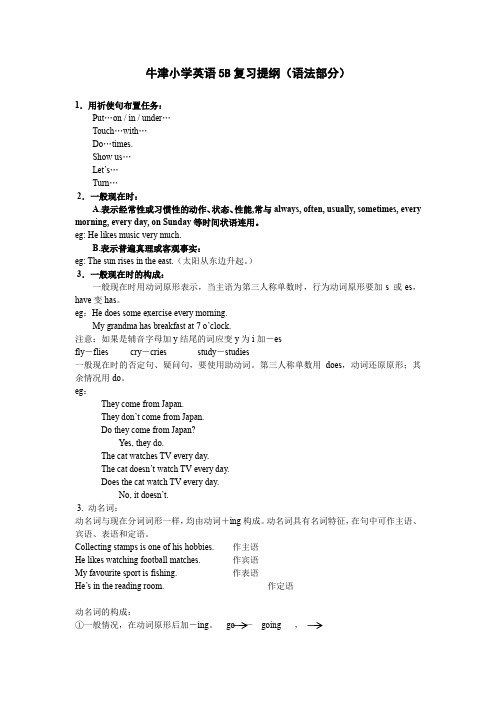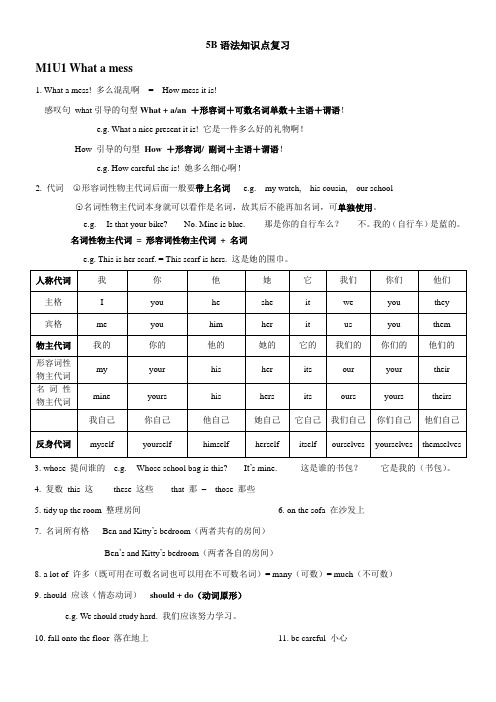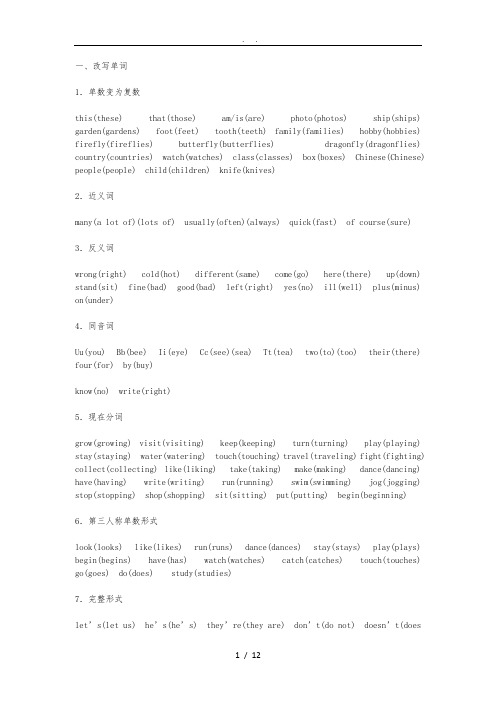牛津小学英语 5B 语法点归纳2
- 格式:doc
- 大小:23.00 KB
- 文档页数:2

牛津小学英语5B复习提纲(语法部分)1.用祈使句布置任务:Put…on / in / under…Touch…with…Do…times.Show us…Let’s…Turn…2.一般现在时:A.表示经常性或习惯性的动作、状态、性能,常与always, often, usually, sometimes, every morning, every day, on Sunday等时间状语连用。
eg: He likes music very much.B.表示普遍真理或客观事实:eg: The sun rises in the east.(太阳从东边升起。
)3.一般现在时的构成:一般现在时用动词原形表示,当主语为第三人称单数时,行为动词原形要加-s或-es,have变has。
eg:He does some exercise every morning.My grandma has breakfast at 7 o’clock.注意:如果是辅音字母加y结尾的词应变y为i加-esfly-flies cry-cries study-studies一般现在时的否定句、疑问句,要使用助动词。
第三人称单数用does,动词还原原形;其余情况用do。
eg:They come from Japan.They don’t come from Japan.Do they come from Japan?Yes, they do.The cat watches TV every day.The cat doesn’t watch TV every day.Does the cat watch TV every day.No, it doesn’t.3. 动名词:动名词与现在分词词形一样,均由动词+ing构成。
动名词具有名词特征,在句中可作主语、宾语、表语和定语。
Collecting stamps is one of his hobbies. 作主语He likes watching football matches. 作宾语My favourite sport is fishing. 作表语He’s in the reading room. 作定语动名词的构成:①一般情况,在动词原形后加-ing。

Unit2重点词组和句型1、a telephone call 一个电话2、at school在学校3、speak to Helen 和海伦通话4、call her给她打电话5、after lunch午饭后 6. be absent缺席 7、speak to him和他说话8、a bad cough 严重的咳嗽9、stay in bed呆在床上10、stay at home呆在家11、get better soon尽快好起来12、feel better感觉好些 13、take some medicine吃一些药14、something else 别的东西15、wrong number打错电话 16、open your mouth张开你的嘴17、have a lot of rest多休息18.see a doctor看医生19、 see you soon.马上见20、get some fruit for you给你带一些水果21、be absent缺席22、be ill生病了23、What's wrong with you? I've got a fever. I'm sorry to hear that.24、How do you feel now? I feel tired. I can get a chair for you.25、May I speak to Su Yang? Yes,this is Su Yang speaking.Unit2重点词组和句型1、a telephone call 一个电话2、at school在学校3、speak to Helen 和海伦通话4、call her给她打电话5、after lunch午饭后 6. be absent缺席 7、speak to him和他说话8、a bad cough 严重的咳嗽9、stay in bed呆在床上10、stay at home呆在家11、get better soon尽快好起来12、feel better感觉好些 13、take some medicine吃一些药14、something else 别的东西15、wrong number打错电话 16、open your mouth张开你的嘴17、have a lot of rest多休息18.see a doctor看医生19、 see you soon.马上见20、get some fruit for you给你带一些水果21、be absent缺席22、be ill生病了23、What's wrong with you? I've got a fever. I'm sorry to hear that.24、How do you feel now? I feel tired. I can get a chair for you.25、May I speak to Su Yang? Yes,this is Su Yang speaking.Unit2重点词组和句型1、a telephone call 一个电话2、at school在学校3、speak to Helen 和海伦通话4、call her给她打电话5、after lunch午饭后 6. be absent缺席 7、speak to him和他说话8、a bad cough 严重的咳嗽9、stay in bed呆在床上10、stay at home呆在家11、get better soon尽快好起来12、feel better感觉好些 13、take some medicine吃一些药14、something else 别的东西15、wrong number打错电话 16、open your mouth张开你的嘴17、have a lot of rest多休息18.see a doctor看医生19、 see you soon.马上见20、get some fruit for you给你带一些水果21、be absent缺席22、be ill生病了23、What's wrong with you? I've got a fever. I'm sorry to hear that.24、How do you feel now? I feel tired. I can get a chair for you.25、May I speak to Su Yang? Yes,this is Su Yang speaking.。

5B知识梳理单词词组主要句型和语法点1.介词:behind, beside, inside, on的用法2.to be 句型:肯定句,否定句,一般疑问句,特殊疑问句及其它们的回答1)Where is it /are they?2)Is it…?3)Whose …is this/are these?4)What time…?5)Whose are/is …?6)What colour …?7)Where’s it now?3.can的句型:肯定句,否定句,一般疑问句,特殊疑问句及其它们的回答1)Can you see? – Yes, I can. No, I can’t.2)What can…?3)…can’t….4.祈使句:8)Be careful/quiet!9)Draw …10)Put …5.形容词1)soft, fluffy, shiny, warm,2)new, small, big, loud, quiet,3)same, different,4)colours5)Seasons6)wet, sunny, cloudy, dry6.连词:and7.名词性的物主代词的用法:mine, yours, his, hers, theirs, ours,8.时间表达法:1)at … o’clock2)in the morning/afternoon3)five past/to one4)nine fifteen/ a quarter past nine9.指示和问路:How can I get to…/How can I get there?10.to do 句型:肯定句,否定句,一般疑问句,特殊疑问句及其它们的回答1)Do you want…?2)Which … do you like?11.have got句型:1)What have you got?2)Who has got…?12.both, all的用法both 两者都,all三者以上,后面所跟名词必须是复数,both rulersall the rulers13.一般过去时: 肯定句,否定句,一般疑问句,特殊疑问句及其它们的回答1)Where was Sam?He was….He wasn’t…Was he….? No, he wasn’t. Yes, he was.2)There was a cat.3)He cut the rice last year.He didn’t cut the rice….Did he cut the rice…..?Yes, he did. No, he didn’t.What did he cut last year?日常会话1.Sorry!2.Excuse me! Ok! You are welcome! Yes, it is. No, it isn’t3.Hello!4.I don’t know. Thank you very much!5.Good night!6.What time is it?。

5B语法知识点复习M1U1 What a mess1. What a mess! 多么混乱啊= How mess it is!感叹句what引导的句型What + a/an +形容词+可数名词单数+主语+谓语!e.g. What a nice present it is! 它是一件多么好的礼物啊!How 引导的句型How +形容词/ 副词+主语+谓语!e.g. How careful she is! 她多么细心啊!2. 代词○1形容词性物主代词后面一般要带上名词 e.g. my watch, his cousin, our school○2名词性物主代词本身就可以看作是名词,故其后不能再加名词,可单独使用。
e.g. -- Is that your bike? -- No. Mine is blue. -- 那是你的自行车么?-- 不。
我的(自行车)是蓝的。
名词性物主代词= 形容词性物主代词+ 名词e.g. This is her scarf. = This scarf is hers. 这是她的围巾。
3. whose 提问谁的 e.g. -- Whose school bag is this? -- I t’s mine. -- 这是谁的书包?-- 它是我的(书包)。
4. 复数this 这- these 这些that 那–those 那些5. tidy up the room 整理房间6. on the sofa 在沙发上7. 名词所有格Ben and Kitty’s bedroom(两者共有的房间)Ben’s and Kitty’s bedroom(两者各自的房间)8. a lot of 许多(既可用在可数名词也可以用在不可数名词)= many(可数)= much(不可数)9. should 应该(情态动词)should + do(动词原形)e.g. We should study hard. 我们应该努力学习。

一、改写单词1.单数变为复数this(these) that(those) am/is(are) photo(photos) ship(ships) garden(gardens) foot(feet) tooth(teeth) family(families) hobby(hobbies) firefly(fireflies) butterfly(butterflies) dragonfly(dragonflies) country(countries) watch(watches) class(classes) box(boxes) Chinese(Chinese) people(people) child(children) knife(knives)2.近义词many(a lot of)(lots of) usually(often)(always) quick(fast) of course(sure)3.反义词wrong(right) cold(hot) different(same) come(go) here(there) up(down) stand(sit) fine(bad) good(bad) left(right) yes(no) ill(well) plus(minus) on(under)4.同音词Uu(you) Bb(bee) Ii(eye) Cc(see)(sea) Tt(tea) two(to)(too) their(there) four(for) by(buy)know(no) write(right)5.现在分词grow(growing) visit(visiting) keep(keeping) turn(turning) play(playing) stay(staying) water(watering) touch(touching) travel(traveling) fight(fighting) collect(collecting) like(liking) take(taking) make(making) dance(dancing) have(having) write(writing) run(running) swim(swimming) jog(jogging) stop(stopping) shop(shopping) sit(sitting) put(putting) begin(beginning)6.第三人称单数形式look(looks) like(likes) run(runs) dance(dances) stay(stays) play(plays) begin(begins) have(has) watch(watches) catch(catches) touch(touches) go(goes) do(does) study(studies)7.完整形式let’s(let us) he’s(he’s) they’re(they are) don’t(do not) doesn’t(doesnot) I’ve(I have) can’t(can not)8.名词所有格Ben(Ben’s)Mike(Mike’s) Su Yang(Su Yang’s) Helen(Helen’s)9.主格his(he) her(she) me(I) them(they) your(you) us(we)10.宾格she(her) he(him) I(me) you(you) they(them) we(us) it(it)二、改写句子1.对画线部分提问It’s half past ten. (What time is it?)The students are in the sprots hall. (Where are the students?)My uncle likes growing flowers. (What does your uncle like doing?)I feel better now. (How do you feel now?)I’ve got a high fever. (What’s wrong with you?)I come from Japan. (Where do you come from?)She is from China. (Where is she from?)The girl in red is my sister. (Which girl is your sister?)Tom comes from the USA.(Who comes from the USA?)2.改为一般疑问句I’m taking some medicine. (Are you taking any medicine?)She feels very tired. (Does she feel tired?)I want to fly a kite. (Do you want to fly a kite?)The boy is standing. (Is the boy standing?)He lives in a small town. (Does he live in a small town?)They can play the piano. (Can they play the piano?)3.改为否定句My mother is taking some medicine. (My mother isn’t taking any medicine.) She can mak e clothes. (She can’t make clothes.)He works from Monday to Friday. (He doesn’t work from Monday to Friday.) They’re buying food in the shop. (they aren’t buying food in the shop.) They play table tennis every day. (They don’t play table tennis every d ay.) That is Jan’s umbrella. (改为同义句)That umbrella is Jan’s.It’s time to have breakfast. (改为同义句)It’s time for breakfast./It’s time for having breakfast.Who is absent today? (改为同义句)Who is not here today?I’m going to the library now. (改为祈使句)Don’t go to the library now.The man puts the plate on his finger. (改为现在进行时)The man is putting the plate on his finger.They are our good friends. (改为单数形式)He is my good friend.They usually do housework on Sundays. (改为单数形式)He usually does housework on Sunday.三、连词成句think, is, today, Saturday, I (.) (I think today is Saturday.) you, can, me, tell (?) (Can you tell me?)I, to, go, China, hope, I, can (.) (I hope I can go to China.) this, subject, you, do, what, like, term (?)(What subject do you like this term?)lesson, it, the, new, the, of, term, is first (.)(It is the first lesson of the new term.)is, stamps, he, showing, to, friends, his, his (.)(He is showing his stamps to his friends.)she, does, making, like, ships, model (?)(Does she like making model ships?)with, what’s, you, wrong (?) (What’s wrong with you?)have, lessons, I, in, four, the, morning (.)(I have four lessons in the morning.)goes, from, he, Friday, to, Monday, school, to (.)(He goes to school from Monday to Friday.)subjects, study, what, he, at, does, school (?)(What subjects do you study at school?)hobby, stamps, is, Ben’s, collecting (.)(Ben’s hobby is collecting stamps.)you, in, what, do, lessons, the have, morning (?)(What lessons do you have in the morning?)you, why, absent, are, today (?) (Why are you absent today?) left, right, Ton, three, turn, times, and (.)(Turn left and right three times, Tom.)you, touch, your, your, head, can, with, hands(?)(Can you touch your head with your hands?)lie, do, on, not, your, back(.)(Do not lie on your back.) putting, the, is man, on, the, apple, finger, his (.)(The man is putting the apple on his finger.)are, the, lesson, students, where, having, a PE (?)(Where are the students having a PE lesson?)fingers, many, does, how, the, have, monkey (?)(How many fingers does the monkey have?)has, a, David, day, busy (.) (David has a busy day.)a, game, basketball, this, there, evening, is (.)(There is a basketball game this evening.)what, it, is, time, now, Ben(?) (What time is it now,Ben?) you, thirsty, feel, do (?) (Do you feel thirsty?)begins, English, at, to, fifteen, our, lesson, ten (.)(Our English lesson begins at fifteen to ten.)like, Mike, does, to, English, speak (?)(Does Mike like to speak English?)same, Tom, are, Jason, From, country, the and (.) (Tom and Jason are from the same country.)are, the, Miss, talking, Wang, students, to (.) (The students are talking to Miss Wang.)want, do, New York, you, go, to, around (?)(Do you want to go around New York?)teaches, he, in, school, English, a, primary (.) (He teaches English in a primary school.)it, today, what, is day(?) (What day is it today?) is, think, interesting, I, English (.)(I think English is very interesting.)us, meet, come, and, here(.)(Come here and meet us.) an, , he, writing, is, his, teacher, to (.)(He is writing an to his teacher.)四、中译英(一)词组1 在周一上午(on Monday morning)2读英语(read English)3上一节美术课(have an Art lesson)4一节有趣的课(an interesting lesson)5上更多的课(have more lesson)6每天(every day)7马上(at once)8午饭后(after lunch)9感到很热(feel hot)10重感冒(a bad cold)11.休息(have a rest)12看医生(see a doctor)13吃一些药(take some medicine)14感到好些了(feel better)15在周三(on Wednesday)16星期四下午(Thursday afternoon)17七门科目(seven subjects)18在一周(in a week)19对…说话(speak to…)20打给我(call me)21患了咳嗽(get a cough)22怎么了(what’s wrong)23在学校(at school)24呆在床上(stay in bed )25错误(wrong number )26拍照(take photos )27集邮(collect stamps)28一位老同学(an old classmate)29一艘轮船(a ship )30购物(go shopping)31种树(grow the trees)32听音乐(listen to music)33出示…给…(show to… )34看一看(have a look)35养金鱼(keep goldfish)36一封(an )37同龄(the same age)38在一个小镇上(in a small town)39一封给我姐姐的信(a letter to my sister) 40居住(live in)41小房子(a small house)42从…到…(from…to…)43安静地坐(sit quietly)44在我家附近(near my home)45做衣服(make clothes)46上学(go to school)47放学后(after school)48做运动(do sports)49一动物邮票(an animal stamp)50拍照(take photos)51养狗(keep dogs)52相同的爱好(the same hobby)53写歌曲(write music)54上网(surf the Internet)55足球踢得好(play football well)56快速地停(stop quickly )57在每周六(on every Saturday)58读报(read newspaper)59浇花(water flowers)60打乒乓球(play table tennis)61弹钢琴(play the piano)62照看(look after)63仔细听(listen carefully)64抬起你的右腿(lift up your right leg)65向左转十次(turn left ten times)66上下跳两次(jump up and down two times)67把他们移到教室(move them to the classroom) 68站成四排(stand in four lines)69发出命令(give orders)70把你的手放在一起(put your hands together) 71弯曲你的膝盖(bend your knees)72做一些早锻炼(do some morning exercise)73在他的背上(on his back)74在体育课上(at a PE lesson)75在体育馆里(in the sports hall)76碰你的手臂(touch your arm)77抬起(lift up)78仰躺(lie on one’s back)79做家庭作业(do one’s homework)80做家务(do housework)81刷牙(brush teeth)82洗脸(wash face)83在八点半(at half past eight)84值日(on duty )85十点三刻(a quarter to eleven)86让我们快点(let’s hurry)87忙碌的一天(a busy day)88十点十分(ten past ten)89没有时间休息(have no time for rest)90从早到晚(from morning to night)91吃一些面包(have somebread)92谈论他们的家庭(talk about their family)93当然(of course)94从书中学到很多(learn a lot from the book) 95搬运一只红色的盒子(carry a red box)96捉蚂蚁(catch ants)97去跑步(go running)98度周末(spend weekends)99团队合作(group work )100在夜间发光(glow at night)101英语俱乐部(the English club)102不同的国家(different countries)103喜欢旅游(live traveling )104一个美国男孩(an American boy)105说法语(speak French)106长城(the Great Wall)107园林(the gardens in Su Zhou)108与…交谈(talk to…)109三个中国男孩(three Chinese boys)110在日本(in Japan)111儿童俱乐部(the Children’s club)112一位忙碌的参观者(a busy visitor)113访问澳大利亚(visit Australia)114一只勇敢的蚂蚁(a brave ant)115一法国地图(a map of France)116去爬山(go climbing )117捉昆虫(catch insects)118游览中国(go around China)119试着…(try to… )120在周末(at the weekends)(二)句子1、小男孩正站在他父亲的肩膀上。

牛津沪教版小学英语五年级下册知识点总结沪教版五年级英语下册(上海牛津5B)知识点总结知识点总结动词的形式:一、动词后面加上ing :①、现在进行时:表示某个动作正在发生或进行。
它的构成方式是:主语+be+动词ing〔现在分词〕形式,有时会要求自己加上be动词(is, am , are )。
句子中经常会出现look, listen,now 等词。
现在进行时的变化肯定句式:主语+be( am, is, are)+ 动词ing+其它.否定句式:主语+be(am, is, are) + not +动词ing+其它.一般疑问句:Be(am, is, are) + 主语+动词ing +其它?特殊疑问句:疑问词(what , where…)+be(am, is, are)+ 主语+动词ing +其它?对现在进行时的特殊疑问句的回答,它不可以用Yes或No直接作答,要根据实际情况回答。
练习:1. What are you ______________ (do)now? I ___________ (eat) bread.2. It ' s nine o ' cloc*.father ________________ (work) in the office.3. Look, the boy __________ (put) the plate on his fin ger.4. _________ he _________ (clea n) the classroom? No, heisn ' t.He ___________ (play).5. Where is Mak? He __________ (run) on the grass.6. Liste n, who _________ (sing) in the music room? Oh,Mary __________ (si ng)there.②like(s), go ,do some , 后面的动词加ing.如:1.1 like (play ) football, but my father likes (play) chess.2. ____________ Let ' s go wim).二、动词后面加s/es.这就有关一种时态:一般现在时。
★清华大学★英语系测试:为中小学生英语量身定做.官方网站:清华大学英语教授50年研究成果语法点归纳:1.Like + 动名词如:like swimming2.Like + 名词的复数如:like masks3.go + 动名词如:go climbing4.How many + 名词复数如: how many watches 5.different + 名词复数如:different countries 6.Same 前加the , 后面一般跟单数,如: the same hobby 7.序数词前一定加the ,如:the first day8.在几点用 at, 如 at 7 o’clock ,在某一天或某一天的具体时间段用on ,如:on Sunday, on Sunday morning, 直接在早上、下午或晚上用in,如:in the morning9.动词后代词用宾格(动宾)如:join me10.介词后代词用宾格(介宾)如:with him ,to her 11. want to +动原, would like to + 动原, sorry to + 动原,forget to + 动原,it’s time to + 动原,12.情态动词can后面加动原,let 后加动原13.祈使句中动词用原形,否定句在句首加Don’t14.助动词(do does don’t doesn’t)后动词用原形15.形容词加名词(形名)如: a beautiful girl16.动词加副词(动副)如: dance beautifully17.Some 用于肯定句,any 用于否定句18.There be 结构就近原则如:There is a teacher and somestudents in the classroom.19.不可数名词:water coffee tea milk juice breadrice food fruit paper chocolate exercise fish 20.乐器前加the, 球类前不加the, (play the 乐器,play 球类)如:play the piano, play football21.Who 当作特殊的第三人称单数1. Listen, Jim __________(sing) an English song in themusic room.2.Wang Bing ____________(like) (make)model ships.3.I ___________(live) in Nan Jing , but my friend (live) in England.4.My father (like) (read)newspaper, but my mother (not)5.It’s two o’clock in the afternoon. We _________ (have)an English class now.6.I like __________(sing), she_________(like)_________(dance).7. What Helen often (do) at the weekends?She often (catch) insects.8.He __________(do not) want (eat) bread forbreakfast.9.I _______(have) a friend. Her name ______(be)Susan.She _____(like) singing and dancing10. __________Yang Ling (have)(some) hobbies ? Yes, she .11.Where (be) Helen and Tom from? They(be) from (American)?12.She usually __________(go) shopping with hermother.13.What’s (Nancy) hobby? She (like) (grow) flowers.14.Mr Smith __________(come) from Australia. Hespeaks (England).15.Look, They __________ (play) football in theplayground.16. __________(do) your sister (watch ) TVevery day? No, she .17.Liu Tao can (swim) (good) . (he)mother can (dance) (beautiful).18.I often go __________(swim) on Sunday afternoon. Butmy mother (go) (shop)19. (Nancy) parents (be) from(Japanese). They’re Japanese (visit).20.How many (child) are there in your class?There (be) thirty.21.A chicken (have) two (foot) .22.I’d like __________(buy) some (peach) in the supermarket.23.Let (we) (help) (she) with (she) homework.24.We __________(want) (go)(fish).25.__________ you __________(skate) now? No, I(write) an e-mail to (I) friend.26.There (be) some milk in the bottle.27.There (be) some (butterfly) and( dragonfly ) in the park.28.What (be) (you) mother(do) now? She (cook) in the kitchen.29.I want to __________(buy) some interesting books atthe bookshop30.There (be) some (knife) and( fork) in the cupboard.31.I (like) (ski). I can(ski) (good).32.Liu Tao and Wang Bing usually __________ (run) afterschool. Look, they (run) in the playground.33.This is (she) book. Those (be)(they) (book).34.Today (be) (teacher) Day . These (card) are for (they).35.I want __________(write) a letter to my friend. Heis (Australia).36. (be) there (some) bread in thefridge? No, there .37.Today is the __________(one) day of the new term.38.There any (student) in the classroom.They (paly) volleyball now.39.Mum and I __________(have) (same)hobby.40.Shall we __________(go) to the cinema by bike? Allright.41.________ (do) your friends (visit) your familyevery week? No, they__________(do).42.What _(be) one plus four? It’s five.43. show (they) how (darw) firefly)44. Who (be) on duty today ?附加题:Where (be) my gloves? They (be)there just now. I can’t find (it).★清华大学★英语系测试:为中小学生英语量身定做.官方网站:清华大学英语教授研究组提供雷雨教学设计(一)创设情境1、图片引入:闪电彩虹2、复习词语二)学习课文1、听情景动画朗读:2、轻声朗读雷雨前的段落,边读边用符号画出描写雷雨前的那些景物。
牛津小学英语5B第二单元知识点归纳一、词汇结构a toothache 牙疼an earache 耳朵疼 a backache 背疼a headache头痛 a stomach ache胃疼 a fever 发烧(a high fever)a cold 感冒 a cough 咳嗽What’s wrong with you? 你怎么了?→ What’s wrong with him? 他怎么了?I’ve got a headache. 我头疼。
He’s got a headache. 他头疼。
I’m sorry to hear that. 听见这些我真遗憾。
What’s wrong with you? = What’s the matter with you?I’ve got = I have got He’s got = He has gotHow do you feel now? 你现在觉得怎么样?I feel thirsty. 我觉得渴。
I can get some water for you.我可以给你弄些水喝。
I feel +形容词Feel tired ( hot hungry cold bored ill)call 打电话,叫唤lunch 中饭(breakfast, supper)speak 说,讲,通话(say)absent 缺席(be absent) stay 停留,呆bad 坏的( ←→good) hear 听见( listen听) soon 尽快feel 感觉,觉得still 仍然,还medicine药(不可数名词)fruit 水果(不可数名词) patient 病人(doctor = Dr.)mouth 嘴巴rest 休息number数目choose 选择wrong 差错better 好些at school 在学校take some medicine 吃些药call her 打电话给她(宾格)Classes are over 课全部结束了(School is over)after lunch午饭后get some fruit for you.给你带些水果(get you some fruit)speak to Helen和海伦通话see you soon 呆会儿见be absent 缺席Anything else?还有别的什么吗?(根据场合翻译意思) stay in bed 呆在床上open your mouth 张开你的嘴巴a bad cough 咳嗽地很厉害have a lot of rest 好好地休息(充分休息)high fever 发高烧wrong number 打错电话choose one to call选一个打电话get better soon尽快好起来(好转)feel better 感觉好多了go to see a doctor去看医生want my mother想要的母亲二、部分语言要点札记1. 电话用语Who’s that speaking? 请问你是谁?Is that Helen? 你是海伦吗?May I speak to Helen? 我可以和海伦通话吗?This is Helen. / This is Helen speaking. 我是海伦。
牛津英语5B知识点总结Unit 1 A new term一、词汇:A.单词:1.week星期 Monday、Tuesday、Wednesday、Thursday、Friday、Saturday、Sunday2.subject学科 Chinese、English、Computer Studies、PE,Art、Maths,Music 、Science科学、Social Science社会minus减去,well哎呀,tell告诉,trick窍门,interesting 有趣的B.词组:1.have a lesson上课2. have a/an … lesson上一节…课3. nice to see you见到你真高兴4.in a week在一星期里5. on Monday morning/afternoon/evening 在周一上午/下午/晚上6. let me see让我看看/想想7.two weeks两星期8.every day/week/Monday每天/每星期/每周一9. this week/term这个星期/这个学期10.in the morning/afternoon/evening在上午/下午/晚上11.welcome to our school/class欢迎来我们学校/班级12.welcome back to school/class欢迎回到学校/班级13.the first lesson of the new term新学期的第一节课14.at once立刻 15.how about 怎么样16.tell me/us/you/him/her/them告诉我/我们/你/他/她/他们17.an interesting …一个有趣的…二、句子:1.---- What day is it today? ----It’s …2.----What lessons do you/they have (in the …)?----I/We/They have … and …3.----What lessons does he/she have (in the …)?----He/She has …and…4.----What subject do you/they like? ----I/We/They like…----What subject does he/she like? ----He/She likes ….5.----What subjects do you/they study at school? ----I/We/They study …6.----What subjects does he/she study at school? ----He/She studies …7.We have eight subjects this term.Wha t are they?They are …这学期我们有八门学科。
Unit 2 备课笔记备课笔记一.单词一.单词1. her (用作宾语)她(用作宾语)她人称代词有主格和宾格之分,主格代词在句子中作主语,宾格代词在句子中做及物动词的直接宾语、间接宾语或作介词宾语。
接宾语、间接宾语或作介词宾语。
Eg.I give her an apple.我给了她一个苹果(I 是主语,her 是宾语)是宾语) When will you go to see him? 你何时去看他(you 是主语,him 是宾语)是宾语)物主代词是用来表示所有关系的,分为形容词性物主代词和名词性物主代词。
形容词性物主代词是不能单独用的,只能作定语。
名词性物主代词可作主语、表语或宾语,但不能作定语,其后不可接名词。
两者的关系为:名词性物主代词=形容词性物主代词+名词。
请看下表:名词。
请看下表:人称代词人称代词 物主代词物主代词 主格主格 宾格宾格 形容词性形容词性 名词性名词性 单数单数第一人称第一人称I me my mine 第二人称第二人称 Y ou you your yours 第三人称第三人称he him his his She her her hers it it its Its 复数复数第一人称第一人称we us our ours 第二人称第二人称 you you your yours 第三人称第三人称they them their Theirs 2.speak v .说,讲说,讲 May I speak to …………? ? 我可以和…..通话吗?通话吗?3.bad adj.坏的,严重的坏的,严重的 ——反义——反义 good 4.get v 变得,得到,购买变得,得到,购买 Get a bad cough 得了重感冒得了重感冒 Get a glass of water get some fruit for you = get you some fruit get Sth. for Sb. = get Sb. Sth. 5.cold n.伤风,感冒伤风,感冒 adj.冷的冷的 Get a cold I ’m very cold 6.fine adj,健康的,极好的健康的,极好的How are you ?------I’I’m fine m fine 你怎么样?我很好你怎么样?我很好7.call v .通话,打电话通话,打电话call her 打电话给她打电话给她 8.why 为什么为什么辨析:what 什么;什么; who 谁; whose 谁的;where 哪里; which 哪个哪个 9.absent adj.缺席缺席 be absent 缺席缺席 10.stay v .停留,呆停留,呆Stay in bed 躺在床上躺在床上 Stay at home 呆在家里呆在家里11.wrong adj.有毛病的,不正常的;错误的有毛病的,不正常的;错误的What What’’s wrong with you? 你什么地方不舒服?你什么地方不舒服?Y ou ou’’re wrong 你错了你错了 12.headache 头痛头痛 backache 背痛背痛 ( )牙痛)牙痛 ( )发烧发烧 13.cough 咳嗽咳嗽 14.hear 听见听见I’I’m sorry to hear that m sorry to hear that 15hope v ,希望希望 16.better adj 好些好些 Get better soon 17.take v 服用服用 Take sonme medicine 18.rest 休息休息Have a lot of rest 19.Say 说,讲说,讲辨析speak 讲(讲某种语言), 通话 , say (一般情况下) 说My parents don’t speak Chinese, they speak English. 我父母亲不讲中文,他们讲英语我父母亲不讲中文,他们讲英语 Don’t forget to sa y goodbye to your teacher. 不要忘了向你的老师说再见不要忘了向你的老师说再见 20. still adv.仍然,还 I still feel ill. I still feel ill. 我还是觉得有病。
∙牛津小学英语 5B 语法点归纳
∙
语法点归纳:
1. Like + 动名词如:like swimming
2. Like + 名词的复数如:like masks
3. go + 动名词如:go climbing
4. How many + 名词复数如: how many watches
5. different + 名词复数如:different countries
6. Same 前加the , 后面一般跟单数,如: the same hobby
7.序数词前一定加the ,如:the first day
8.在几点用 at, 如 at 7 o’clock ,在某一天或某一天的具体时间段用on ,如:on Sunday, on Sunday morning, 直接在早上、下午或晚上用in,如:in the morning
9.动词后代词用宾格(动宾)如:join me
10.介词后代词用宾格(介宾)如:with him ,to her
11. want to +动原, would like to + 动原, sorry to + 动原,forget to + 动原,
it’s time to + 动原,
12.情态动词can后面加动原,let 后加动原
13.祈使句中动词用原形,否定句在句首加Don’t
14.助动词(do does don’t doesn’t)后动词用原形
15.形容词加名词(形名)如: a beautiful girl
16.动词加副词(动副)如: dance beautifully
17.Some 用于肯定句,any 用于否定句
18.There be 结构就近原则如:There is a teacher and some students in the classroom.
19.不可数名词:
water coffee tea milk juice bread rice food fruit pape r chocolate exercise fish
20.乐器前加the, 球类前不加the, (play the 乐器,play 球类)如:play the piano, play football
21.Who 当作特殊的第三人称单数。